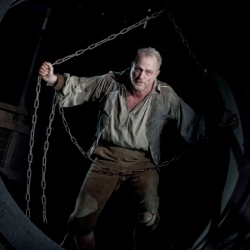Fidelio (Garsington Opera at Wormsley Estate)

© Mike Hoban
Returning to the title-role from the original production, Rebecca von Lipinski was an imposing and convincingly masculine presence, singing with clarion tone in the ensembles but curiously careful in her great solo scene. As her luckless admirer Marzelline, newcomer Jennifer France was utterly enchanting: her bright, penetrating soprano is consistently appealing and packs enough punch to give Leonore a run for her money in the Act One ensembles. Her Jaquino, Sam Furness, seemed a little unsteadied by first-night nerves (and perhaps by the high pollen-count) in his first scene, but warmed up for the sublime quartet and demonstrated excellent comic timing without ever playing to the gallery.
The revelation of the evening, for me, was Peter Wedd’s tireless Florestan, never betraying the slightest strain even when contorted into some decidedly singer-unfriendly positions (Incredibly, he dispatched the treacherous opening section of his aria lying on his back, and was already installed in his shackles a good twenty minutes before curtain-up). Physical effort is foregrounded in the production as a whole, right from ‘Fidelio”s first exhausted entrance, and has its apotheosis in Wedd’s tortured physicality here. He’s singing Tristan at Longborough next summer, and on the evidence of this performance I’d advocate begging, borrowing or stealing a ticket to hear him.
"blustery brutality"
Stephen Richardson’s bluff, sympathetic Rocco catches all the facets of a man struggling to retain his humanity in the face of corrupt forces, canny when dealing with Pizarro and endearing in his frequent horseplay with his daughter. Garsington veteran Darren Jeffrey sings Pizarro with plenty of blustery brutality, but the portrayal of the character as a one-dimensional pantomime villain somehow diminishes rather than intensifying his menace. (The final image, of Pizarro cornered in Florestan’s cell, is a striking coup de théâtre). But the real stars of the evening other than Wedd were the superb young male chorus, who all but raised the roof in a hugely moving ‘O welche Lust!’ and did a fantastic job of retaining their individual characters throughout.
My only quibble with Cox’s refreshingly traditional staging ("completely set in its time", as Boyd describes it in an insightful programme interview) was that the great reunion of husband and wife seemed oddly anti-climactic, despite radiant singing from Wedd and Lipinski. (My companion commented that the reunion of Florestan and Don Fernando – robed, unusually, as a cleric and sonorously sung by Joshua Bloom – actually felt like the emotional crux of the drama).
Garry McCann’s sparse, monochrome set and Howard Hudson’s lighting were unobtrusively atmospheric, and the semi-outdoor setting played its own special role in the proceedings: little flukes such as the sunlight breaking from behind a cloud as the prisoners emerged from their cisterns to the accompaniment of birdsong outside, and the chilly gust of wind as Pizarro announced his evil intentions were quite magical.










